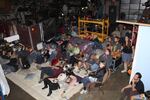Oakland is a long way from Portland, but for some artists, the repercussions of the Bay Area’s Ghost Ship fire feel very close at hand.
Prosecutors in Oakland, California, sent shock waves through the art world June 5, filing criminal charges against two artists from the Ghost Ship warehouse. Thirty-six people died when the building was consumed by fire during an electronica show on Dec. 2.
Alameda County District Attorney Nancy O’Malley leveled 36 counts of involuntary manslaughter against two men who lived and worked at Ghost Ship: Derick Ion Almena and Max Harris.
“Defendants Almena and Harris knowingly created a fire trap with inadequate means of escape. They then filled that area with human beings and are now facing the consequences of their actions," O'Malley said at a news conference.
The guy whose name was on the Ghost Ship lease is Derick Almena. Max Harris did some administrative things to help Almena, like collecting rent money. He was on site the night of the fire.
O’Malley explained that, to win the case, her office would have to prove the defendants acted recklessly, disregarding for human life, and that the consequences were reasonably foreseeable.
“There’s been much discussion in the public forum as well as in the media since the fire happened about the need for space where artists can live and work in Oakland and surrounding cities. I wholeheartedly support our arts community … but every single one of those individuals deserves to live or work in a space that is safe,” she said.
This is far from the only legal action in the works over Ghost Ship. Victims' families have filed civil lawsuits against a slew of defendants: the city of Oakland, Alameda County, the state of California, and — separately — against the power provider, Pacific Gas and Electric.
There are negligence claims against the woman who owned the building, the promoter of the event and the musician who headlined the show — a guy from Madison, Wisconsin, who performs as Golden Donna.
But the state confined its criminal charges to the two artist-administrators, and defense attorneys are urging the public to take note.
Kyndra Miller is part of the team defending Derick Almena, pro bono. At a news conference June 9, the attorneys accused the D.A.’s office of trying to offer cover for pending civil cases by pinning wrongdoing on artists rather than regulators.
“Rather than go after the true wrongdoers in this case,” Miller said, “The D.A. has chosen weakest and most vulnerable in this situation. And that is my client.”
At that same news conference, Derick Almeda’s wife, Micah Allison, spoke out, standing in front of a large photograph of herself, her husband and two of their three children.
“My family is a very close and loving family, which, like many families, has struggled,” she said, adding, “We would never have lived in a place we thought was unsafe.
Reporting by the New York Times and the East Bay Times suggests at one point, the county removed the couple's children from their home because of building safety concerns.
The family was not in the building when the fire happened. Allison said they checked into a hotel because they knew the show would be noisy.
But Allison said the allegations about her family are not the point.
“My desire is that the obvious focus of the media on demonizing us be shifted back to the real issue at hand, which is how to create safe and affordable live/work spaces for artists," she said. "I do not want to be seen as a victim, but rather (have it) acknowledged we all need help and support. … We are all grieving.”

Hat maker Faith Jennings, along with metal artist Richard Cawley, saw a variety of creative spaces during their years with March Fourth Marching Band.
Aaron Scott / OPB
There are deep ties and a lot of movement between the San Francisco/Oakland arts community and Portland. Faith Jennings, the designer behind the recycled clothing line Faith Hats, learned about the fire on Facebook while it was happening. One of her friends was at the show and survived the blaze.
"There was an almost immediate attitude of a lot of accountability and people assigning some blame,” she said. The tragedy mixing with so many other emotions made for a lot of divisiveness within art communities, she added, between people defending an unconventional space and those calling for accountability.
Jennings makes her hats out of a studio space at the Egg, a warehouse in Southeast Portland filled with musicians, acrobats and other artists. She sat down with us, alongside metal fabrication artists Richard Cawley and Gustav Sculptor — the operators of another collective warehouse space, Manifestation PDX. It shares some creative DNA with unpermitted spaces like Ghost Ship, with two major differences: artists aren’t allowed to live onsite, and Manifestation PDX is regularly inspected by city officials to verify its compliance with relevant codes and permits.
“I’m sure everyone is on guard now,” Cawley said, with Jennings adding that, in the weeks after the Ghost Ship fire, artists at the Egg gathered to review safety procedures and make sure the building was compliant with fire codes.
The Egg started in 2004, and Jennings said the group made the choice early on not to be an event space because of the liability they would have to assume and the expense of complying with city assembly codes. Manifestation, on the other hand, throws parties. Big ones. And each requires applying for a permit weeks in advance, paying a $300 fee, and providing maps of the building with exits highlighted and other safety precautions.
“We apply for this thing and [city inspectors] come on the night of the party to see that we are complying," said Sculptor. "I want them there. If they're never there, and I'm just paying for a permit, then I'm going to be like, what am I paying for? And then I'm doing something wrong that does become a problem. I need help checking that.”
Jennings said she's still angry about the Ghost Ship fire and the ripple effect. She's heard about artist warehouse spaces shutting down in New York, Baltimore, California and elsewhere. (We found other cases in Detroit and Denver.)
“Everyone suddenly doesn’t want to be the next Ghost Ship,” she said, but the resulting closures can be dangerous too. “When the government’s approach is just to shut everything down, it’s going to shove people underground.”

A political gathering at Manifestation PDX.
Courtesy of Manifestation PDX
Beyond the Everett Street Lofts and Mile Post 5, Portland doesn’t have much by way of live-work space. The three warehouse denizens feel it’s just a matter of time before their landlords sell their warehouses to be developed into residential buildings unless the city makes a real commitment to maintaining creative spaces and developing new live-work spaces.
Portland Fire Marshall Nate Takara told us the bureau inspects about 15,000 spaces per year. He says cases of illegal occupancy — not limited to artists spaces — come up weekly.
“Generally it’s spread out through the city," Takara said. "I don’t think there’s one part of town that has a higher frequency of illegal use.”
The bureau makes some judgment calls in how it enforces the rules, collaborating with the Bureau of Development Services, which issues permits.
“The bottom line is to make sure that all (using) the space are safe," Takara said. "The one area of great concern we have is when someone is using a space for sleeping when it’s not permitted for that use.” He said if an inspector come across such a case, he or she would notify a senior inspector immediately.
"The decision on whether to do an eviction depends upon the circumstances,” Takara said. "Is there proper exiting in a building? Can something be done to fix the situation?"
“If we can provide some kind of safety net, smoke alarms,” the Bureau is open to leaving unpermitted spaces open, Takara said. “Each situation is a little different.”
Takara said nothing is impossible, but he's pretty confident the Bureau has systems in place that would prevent what happened in Oakland from repeating here — from partnerships with the police and other bureaus to relationships with sources — not to mention Facebook's wellspring of info about upcoming shows and events in warehouse spaces.
But Takara said Portland did change one thing after the Ghost Ship fire: beginning Jan. 1, 2018, dance-club type events with more than 100 people will require the space to have fire sprinklers.
That’s likely to have a chilling effect on spaces like Manifestation PDX, without the capacity to buy and install such a system.
Special thanks to the staff of KQED in San Francisco for sending us tape from the Ghost Ship news conferences.